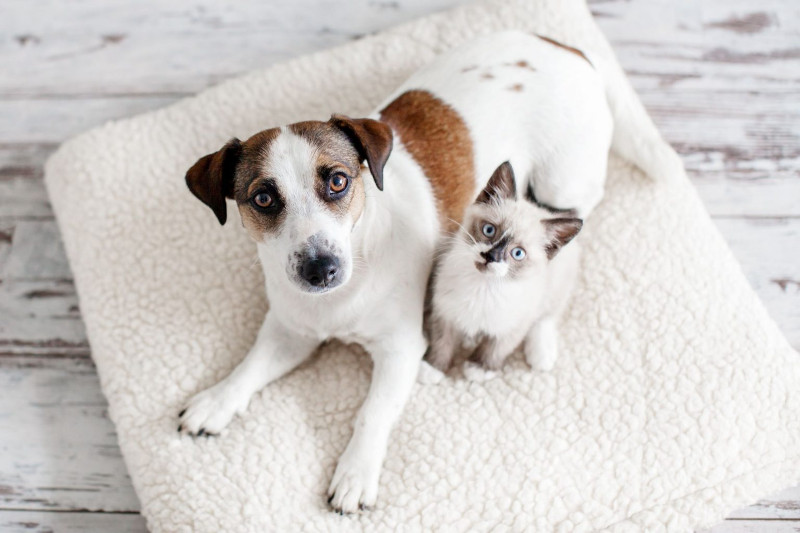Puppy & Kitten Care

So, you brought a puppy or kitten home – congrats! Getting all of the appointments and vaccines figured out can be overwhelming, but we’re here to help. Our veterinary team follows the medical standard for puppy and kitten care, and will be with you every step of the way to make their first appointment all the way to their first year appointment as simple as can be.
Vaccine Schedules
Below are the standard appointment and vaccination schedules for both healthy puppies and kittens. If your pet is slightly older, is somewhere in the middle of this schedule, or has another specific circumstance we are happy to work with you in finding the best schedule to keep your pet protected safely.
The standard puppy appointment and vaccine schedule includes:
- At 6-8 weeks: 1 Distemper, Adenovirus type 2 (Hepatitis), Parvovirus, and Parainfluenza (DA2PP) booster
- At 9-11 weeks: 1 DA2PP booster and 1 Bordetella vaccine
- At 12-14 weeks: 1 DA2PP booster
- At 15-17 weeks: final DA2PP vaccine, 1 Rabies vaccine, 1 Leptospirosis booster
- At 20-21 weeks: final Leptospirosis vaccine
- We will recommend deworming your puppy and checking a fecal sample to look for intestinal parasites.
The standard kitten appointment and vaccine schedule includes:
- At 6-8 weeks: 1 Feline Viral Rhinotracheitis, Calicivirus, and Panleukopenia (FVRCP) booster
- At 9-11 weeks: 1 FVRCP booster
- At 12-14 weeks: 1 FVRCP booster
- At 15-17 weeks: final FVRCP booster, 1 Rabies vaccine
- We will recommend deworming your puppy and checking a fecal sample to look for intestinal parasites.
The Difference Between Core & Lifestyle
Core vaccines are essential vaccinations that protect against highly contagious and potentially life-threatening diseases. For dogs, core vaccines include rabies and DA2PP (distemper, adenovirus, parvovirus, and parainfluenza). For cats, core vaccines include rabies and FVRCP (feline viral rhinotracheitis, calicivirus, and panleukopenia). Keeping up to date with these vaccinations ais critical to avoid serious risks to both pets and public health.
Lifestyle vaccines may be recommended by your veterinarian or chosen by you, the owner, to implement in your pet’s life based on environments, habitats, and exposure risks to your pets. Some factors include whether your pets board frequently, hike outdoors, interact with other animals outside of the home, or live in areas where certain diseases are more common.
In regard to other lifestyle choices for pets, Crossroads Animal Hospital does not crop ears, dock tails, or declaw. Crossroads Animal Hospital only performs cesarean section procedures in emergency situations in which medical intervention is required for the safety of both pet and litter.
Vaccine Side Effects
Small animal (dog and cat) vaccines, like all other medical treatments, carry some risk of side effects. These side effects are typically minor in comparison to the symptoms of the diseases they protect against. Allergic reactions are a possibility; if you suspect your pet is experiencing an allergic reaction to a vaccine you should immediately reach out to your veterinarian for care (AVMA, 2025).
American Veterinary Medical Association . (n.d.). Vaccinations.
https://www.avma.org/resources-tools/pet-owners/petcare/vaccinations

